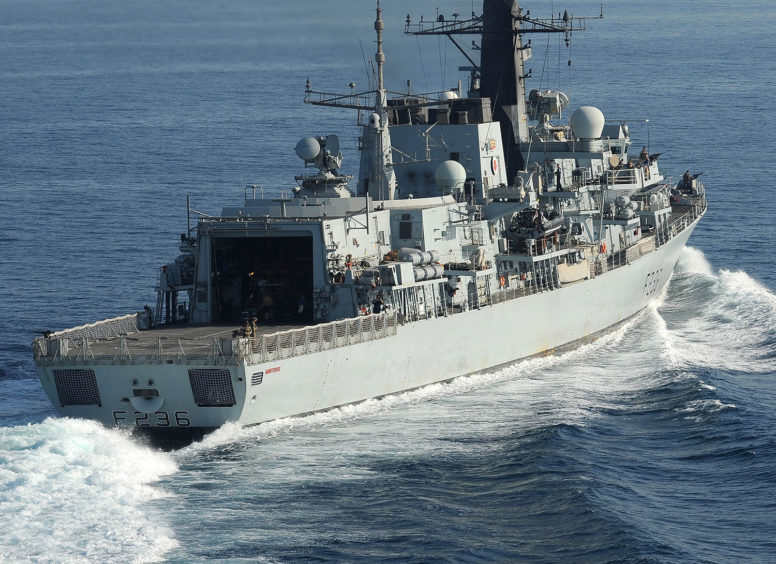
The British navy intervened to stop Iran from blocking a commercial oil tanker leaving the Persian Gulf, heightening friction just as European nations scramble to salvage a landmark nuclear accord with the Islamic Republic.
The BP Plc-operated British Heritage, which can carry as much as 1 million barrels of oil, was attempting to pass through the Strait of Hormuz, a shipping chokepoint at the mouth of the world’s largest oil-producing region, when three Iranian vessels tried to impede it, according to a U.K. government statement. Iran denied the charge.
The incident marks an escalation in a row that started after U.K. forces seized a tanker off Gibraltar earlier this month that was suspected of carrying Iranian oil to Syria. Iran denied the vessel was heading to Syria and vowed to retaliate. Britain’s action opened up a wrangle that could drag on for months and complicate efforts to contain a brewing crisis over Iran’s compliance with a 2015 deal meant to prevent it from developing a nuclear weapon.
The Royal Navy’s HMS Montrose, which was escorting the tanker, “was forced to position herself between the Iranian vessels and British Heritage and issue verbal warnings to the Iranian vessels, which then turned away.”
“We are concerned by this action and continue to urge the Iranian authorities to de-escalate the situation in the region,” the statement said.
Iran’s Revolutionary Guard Corps denied trying to impede the British tanker but said its forces could act fast if ordered to do so. “If it receives an order to seize foreign ships, naval forces can act fast, with determination and without hesitation within the geographic scope of its mission,” the semi-official Fars news agency reported.
Benchmark Brent crude was 13 cents higher at $67.14 a barrel in London trading at 7:07 a.m. local time. Oil has been rallying since the middle of last week as tensions surrounding Iran stoke concerns crude flows may be disrupted.
The British Heritage was able to pass safely through the Strait of Hormuz and was now sailing along the Omani coast, according to tanker tracking data compiled by Bloomberg.
Thursday’s developments spotlight, however, the mounting risks to shipping in a region that exports about a third of all seaborne petroleum. BP had been keeping the British Heritage empty inside the Gulf, near Saudi Arabia, rather than risk its seizure by Iran in a tit-for-tat retaliation, a person familiar with the matter said Monday.
Six tankers have been attacked outside the Gulf since early May, with the U.S. blaming Iran for the incidents, a charge Tehran denies. Insurance costs for covering tankers and their cargoes jumped as much as tenfold in the wake of the incidents. Some owners were initially wary of sending vessels to the region, although that reticence appears to have subsided.
The prospects of a showdown between the U.S. and Iran have spiked since the Trump administration quit the multiparty nuclear accord with Iran a year ago and re-imposed sanctions. In early May, the U.S. tightened penalties on buyers of Iranian oil prompting Iran to begin scaling back its commitments under the deal.
Iran said this week it’s enriching uranium beyond the agreed cap and would gradually roll back compliance unless European signatories find ways to ensure it can sell its oil and access the global financial system.
Iran is producing oil at the slowest clip since 1986, making U.S. sanctions as effective as the devastating Iraq-Iran war that ended more than 30 years ago. The measures have hit the currency, fueled inflation and hobbled growth.
UK Friction
The stand-off also comes at an awkward time for Britain which, along with its European allies, is trying to keep the nuclear deal alive, but is also relying on Trump’s White House to clinch a trade deal after Brexit.
U.K. special forces assisted the authorities in Gibraltar, an independently governed U.K. territory south of Spain, when they seized a super tanker on July 4 over allegations that it was carrying Iranian oil to Syria in breach of EU sanctions.
The British Heritage was meant to load crude from Iraq before sailing onto Europe but a person with knowledge of the matter said BP elected not to lift the cargo because of concerns about the wider political situation. The ship didn’t have oil on board when it left the region, the person said.
There are six vessels operating in the Gulf registered to Britain, or a British Overseas Territory, and five operating under the British flag. In total, they have the capacity to transport almost 9 million barrels of crude.
The incident was originally reported by CNN, which cited two U.S. officials saying Iran had tried to seize, rather than impede, the tanker and order it to change course.